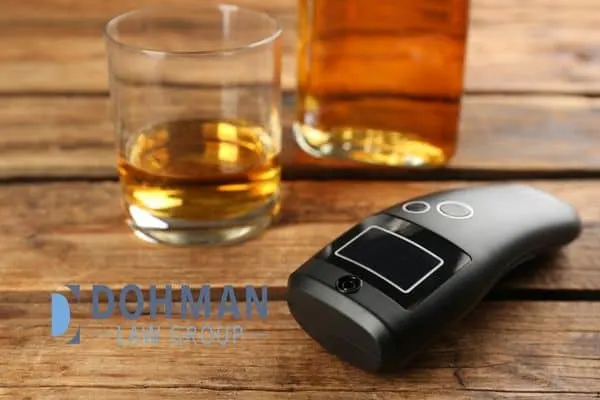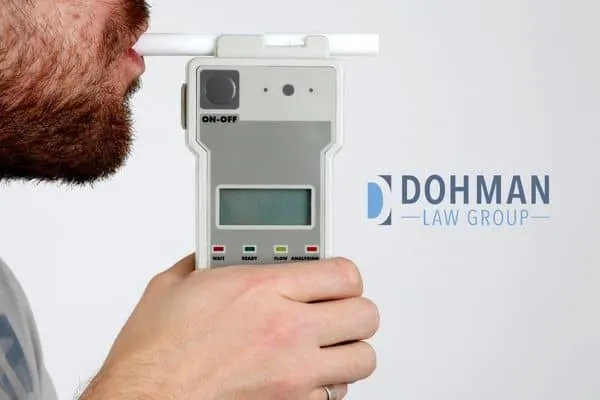We’ve all heard horror stories of people being arrested for Driving Under the Influence (DUI) even though they hadn’t had anything to drink. Perhaps, you have even been out for drinks with friends and had one too many, only to be stopped by the police on your way home. Then you know the sinking feeling of dread that comes with being asked to submit to a breathalyzer test.
After blowing into the breathalyzer machine, you find out that your blood alcohol content (BAC) is over the legal limit. So, while breathalyzers are generally accurate, there are a few factors that can cause them to give a false positive.
If you’re concerned about breathalyzer inaccuracies, here’s everything you need to know and the legal remedy available. For any further questions, call Dohman Law today and speak with a highly skilled Illinois DUI defense lawyer.
Understanding Breathalyzers
Breathalyzers are devices that measure the amount of alcohol in your system by analyzing your breath. They’re commonly used by police officers to determine whether or not someone is too impaired to drive. According to statistics, every year in the U.S., drunk driving causes about 10,000 deaths. As such, law enforcement takes this offense very seriously.

When you’re pulled over on suspicion of drunk driving, the police officer will usually ask you to step out of your car and perform a few sobriety tests. These tests can include walking in a straight line or standing on one leg. If the officer suspects you’re impaired, they may ask you to submit to a breathalyzer test.
In most states, you can refuse to take a breathalyzer test. However, if you do refuse, you may face automatic penalties, such as license suspension. So, if you decide to take the test, it’s important to understand that there is a small margin of breathalyzer error.
What is a Blood Alcohol Content (BAC)?
In order to understand how breathalyzers work, you need to understand your blood alcohol content. This is the percentage of blood alcohol concentration, and it is affected by a variety of factors, including how much alcohol you have consumed, your weight, your health conditions, your sex, and how quickly you drink.
The legal limit for BAC in most states is .08%. This means that if your BAC is .08% or higher, you are considered legally intoxicated and can be arrested for DUI.
How do Breathalyzers Work?
When you drink alcohol, it’s absorbed into your bloodstream and circulated throughout your body. A small amount of alcohol is exhaled through your breath.
The amount of alcohol in your breath is directly proportional to the amount of alcohol in your blood. So, by measuring the amount of alcohol in your breath, a breathalyzer can estimate the amount of alcohol in your system.
Fuel Cell Technology
Fuel cell breathalyzers are the most accurate type of breath-testing device. This type of sensor is susceptible and can accurately measure tiny amounts of alcohol. However, they are also the most expensive. Fuel cell breathalyzers are typically only used by law enforcement officers either at the police station or in a mobile testing unit
Semiconductor
Semiconductor breathalyzers are less accurate than fuel cell breathalyzers, but they are also less expensive. Semiconductor breathalyzers are typically used by individuals, more or less like personal devices.
Related Content: Questions to Ask Your DUI Lawyer
Errors in BAC Testing
There is always a margin of error when measuring the breath alcohol content. The margin of error “Error Rate” depends on a number of factors, including:
- The type of machine used
- The calibration of the machine
- The person administering the test
- The person being tested
The error rate on breathalyzer tests can be as high as 20%. This means that a reading of 0.08 could actually be anywhere between 0.064 and 0.096. When this usually happens, it is referred to as a false positive.
A false positive can have serious consequences. If you are convicted of DUI based on a false positive, you could face jail time, fines, and the loss of your license. You could also have difficulty finding a job or renting an apartment.
Factors for Breathalyzers Inaccuracies
It turns out that there are a number of factors that can contribute to inaccurate readings from breathalyzers. Here are the common factors that can cause a breathalyzer to give a false positive:
Mouth Alcohol
Mouth alcohol can cause a false positive on a breathalyzer test. Mouth alcohol is any alcohol that’s in your mouth at the time you blow into the breathalyzer machine. This can happen if you’ve recently had a drink, or if you have burped within the last 15 minutes. Mouth alcohol can also come from things like mouthwash, breath mints, and cough syrup.
Medical Conditions
There are a few medical conditions that can cause a false positive on a breathalyzer test. One condition is gastroesophageal reflux disease (GERD). GERD is a condition that causes stomach acid to back up into the throat. This can cause a person to burp, which can then introduce mouth alcohol into the breathalyzer sample.

Another condition that can cause a false positive is diabetes. People with diabetes may have high levels of ketones in their breath. Ketones are a byproduct of the breakdown of fat (“Body Fat Level”), and they can be mistaken for alcohol by a breathalyzer.
User Error
There are a few ways that users can cause a breathalyzer to give a false positive. One way is by not following the instructions properly. For example, if you don’t wait 20 minutes after eating or drinking before taking the test, your mouth alcohol levels will be higher than they should be.
Another way users can cause a false positive is by not blowing hard enough into the breathalyzer. If you don’t blow hard enough, the machine won’t get an accurate reading.
Maintenance and Testing
Breathalyzers must be properly maintained and tested in order to produce accurate results. If a breathalyzer is not properly maintained or tested, it may produce a false positive. In most cases, false positives caused by breathalyzers are the result of user error or a lack of proper maintenance.
Incompetent Administering Personnel
The officer administering the breathalyzer test must be properly trained and experienced in order to produce accurate results. If an officer is not adequately trained or experienced, he or she may administer the test incorrectly, which could lead to a false positive.
Weather Conditions
Depending on the weather, breathalyzer tests may not be entirely accurate. Cold weather can cause a false positive, while hot weather can cause a false negative. For example, if you take a breathalyzer test in cold weather, your breath may contain condensation, which can be mistaken for alcohol by the machine. Altitude and windy conditions also play a factor.
Chemical Compounds and Breathalyzers
Breathalyzers can be affected by other chemical compounds. These compounds can come from a variety of sources, including food, cosmetics, and cleaning products.
For example, acetone is a compound that is found in some foods and cleaning products. Acetone can cause a false positive on a breathalyzer test. Another example is isopropyl alcohol, which is found in some cosmetics. Isopropyl alcohol can also cause a false positive on a breathalyzer test.
Others include cigarette smoke, chemical fumes, paint fumes, and gasoline. All of these can cause a false positive on a breathalyzer test, e.g. through a breath sample.
You Need a Lawyer!
If you have been charged with DUI based on a breathalyzer test, it is important to immediately speak to an experienced DUI attorney who can challenge the accuracy of the test. A DUI defense attorney will know how to properly challenge the accuracy of the breathalyzer test and get the charges against you dismissed. At Dohman Law Group, we are Chicagoland’s leading defense team for DUI & Traffic violations and we can help you too. For a consultation, call us at 847-359-4005


